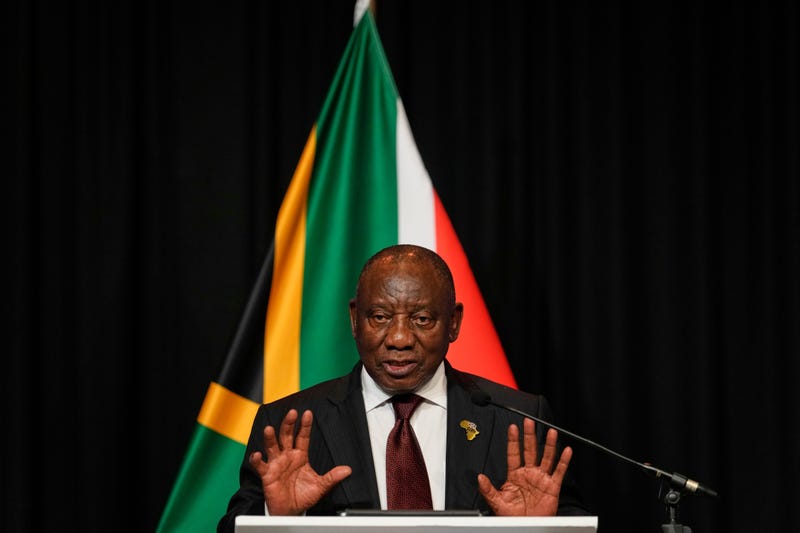
JOHANNESBURG (AP) — A representative from the U.S. Embassy in South Africa will attend the formal handover ceremony at the end of this weekend's Group of 20 summit in Johannesburg, but Washington still won't take part in any talks, a White House official said Thursday.
The official, who wasn't authorized to speak publicly and spoke on condition of anonymity, was responding to comments by South Africa's president that the United States had indicated that it had a “change of mind” over its boycott at the “11th hour.”
U.S. President Donald Trump announced this month that no U.S. government official would attend the two-day meeting of world leaders from rich and developing countries in South Africa's biggest city.
Trump cited his claims that South Africa is violently persecuting the country's white Afrikaner minority farmers as the reason for the U.S. boycott. Those statements by Trump have been widely rejected.
Handover ceremony
The U.S. is due to take over the rotating presidency of the G20 from South Africa, and a formal handover ceremony is traditional at the end of each summit.
President Cyril Ramaphosa previously expressed disappointment that the U.S. boycott would mean that he hands over to an “empty chair” at the end of the summit.
On Thursday, South Africa's leader said that he welcomed U.S. participation at Africa's first G20 summit “in one shape or form or another” and viewed the late communication as a “pleasing” change of approach from the world's biggest economy.
“The United States is a member of the G20, they are an original member of the G20, so they have the right to be here,” Ramaphosa said. “And all we are seeking to do is looking at the practicalities ... for them to participate.”
U.S. boycott
Ramaphosa had also addressed the U.S. boycott — which threatens to undermine the summit — earlier Thursday, when he said that the G20 meeting would issue a joint declaration, despite pressure from Washington not to issue one.
A South African G20 official said earlier this week that the U.S. had sent diplomatic communication to South Africa advising that that there should be no declaration adopted at the summit, because the U.S. wasn't there and therefore there would be no consensus.
Instead, the U.S. wants a toned-down statement from South Africa only to cap the summit, which is a culmination of more than 120 meetings that Africa’s most advanced economy has hosted since it took over the G20’s rotating presidency for this year.
'We will not be bullied'
Speaking to reporters after an earlier speech, Ramaphosa said: “We will have a declaration. The talks are going extremely well. I’m confident we are moving towards a declaration, and they are now just dotting the i’s and crossing the t’s.”
“Without the United States, the whole process of the G20 is moving forward. We will not be bullied. We will not agree to be bullied.”
Other leaders have expressed hope that the summit results in a declaration. German Chancellor Friedrich Merz said Wednesday that he hopes for “joint decisions," but conceded that “that is not entirely certain."
Trump's criticism
Trump has repeatedly targeted South Africa for criticism since he returned to office. He held a tense meeting with Ramaphosa at the White House in May, when he confronted South Africa’s leader with baseless claims of widespread violence against Afrikaners, who are descendants of Dutch, French and German settlers who first came to South Africa in the 17th century.
The U.S. president has repeated his claims in the leadup to the G20 that Ramaphosa’s Black-led government is pursuing racist anti-white policies against Afrikaners.
G20 agenda
The G20 is a bloc made up of 19 nations, including the richest but also the top developing economies, the European Union and the African Union. The bloc is meant to bring developed and developing nations together to find solutions to global problems.
South Africa, which is the first African nation to hold the rotating presidency, is hoping to use its summit to make progress on issues especially affecting poor countries. That includes mitigating the impact of climate change and weather-related disasters, easing debt burdens for developing countries and confronting global wealth inequality.
European Commission President Ursula von der Leyen and European Council President António Costa met with Ramaphosa on Thursday in Johannesburg and expressed support for South Africa's agenda.
The U.S. has previously derided South Africa’s priorities for the group, with U.S. Secretary of State Marco Rubio skipping a G20 foreign ministers meeting in February and dismissing South Africa’s priorities as being about diversity, equity and inclusion and climate change.
Rubio said that he wouldn't waste U.S. taxpayer money on that agenda.
Other leaders are also skipping the G20 summit, including Chinese leader Xi Jinping, Russian President Vladimir Putin and Argentine President Javier Milei, but they have sent delegations to represent them in the talks.
“The only country that is not in the room is the United States and, of course, it is their choice not to be in the room,” Xolisa Mabhongo, a South African ambassador to the G20, told national broadcaster SABC this week.
___
Michelle L. Price reported from Washington.
___
Follow AP’s coverage of the G20 summit in South Africa: https://apnews.com/hub/g20-summit